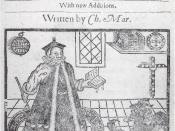David Norris
ENGL 210
Mr. Michael Griffith
20 April 2007
Research Essay: Question One
Marlowe's Faustus tests the older religious system of values and the new humanist ideals. Each offered a uniquely different path in which one should best to follow or lead their particular life. The play is a fine example of a hybridized work that draws on both the strengths and weaknesses from each school of thought. In the essay The Defense of Poesy published nine years before Marlowe's Faustus, Sir Phillip Sidney boldly proclaimed that true art has the ability to help "men to imitate, both delight and teach, to move men to that goodness in hand." [Greenblatt 959] Marlowe places this onus on the reader; it is for him alone to decide and to experience the pathos of Dr. Faustus, and finally ask the question of themselves 'what is my soul worth?' As a seminal playwright Marlowe sets to prove the words of Joyce that poetry is a revolt against artifice, a revolt, in a sense, against actuality.
[Laman 3]
In drawing further material from Sidney's defense there is an even greater claim of true arts merits, that is, not only that it both teaches and delights, but also, offers a "higher moral purpose" and is "full of virtue-breeding delightfulness." [Greenblatt 973]
In this sense, the art is lifted off the page and becomes proactive in the hearts of its readers to catalyse a positive change. This is, of course, almost impossible to quantify or prove, but rather, it is felt. After reading a play like Marlowe's Faustus there is a distinct feeling of "knowledge that lifts up the mind from the dungeon of the body to the enjoying of his own divine essence." [960] he history of this poetic art is as old...


